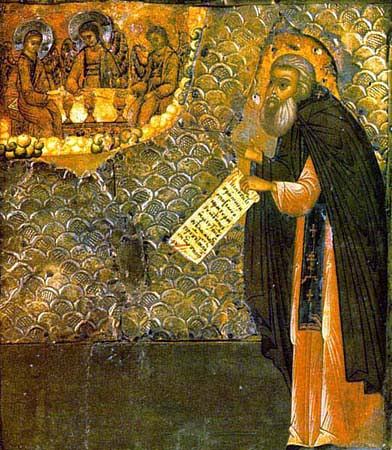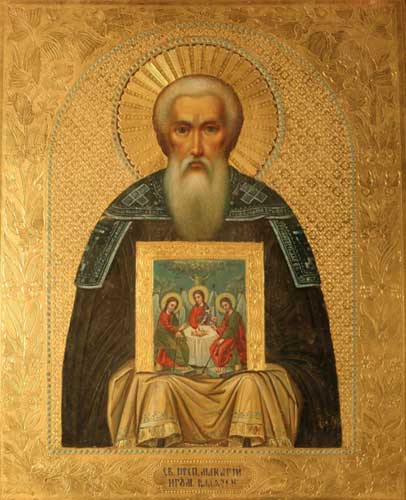
The Monk Makarii of Kalyazinsk (in the world Matfei) was born in 1400 in the village of Gribkovo (Kozhino), near the city of Kashin, into the family of the boyar Vasilii Kozha. From youth he yearned after monasticism, but at the will of his parents he married. After a year his parents died, and after three years more reposed also his wife Elena. Having nothing that would bind him to his former life, Matfei was vowed a monk at the Nikolaev Klobukovsk monastery. Out of love for solitude he left the city monastery and together with 7 monks he found a place 18 versts from Kashin amidst two lakes near the Volga. Here the monk raised up a cross and founded a solitary wilderness monastery. The boyar Ivan Kolyaga, to whom the nearby lands belonged, began to fear that a monastery would grow up, which would begin to cultivate the wastelands. The enemy of salvation planted in the boyar such spite and enmity, that he decided to kill the saint. But suddenly a grievous illness befell him. Fear of the nearness of death awakened repentance in the boyar. The sick Kolyaga gave orders to carry him to the monk and at his feet told about his evil intent and asked forgiveness. "God forgive thee", – answered the humble ascetic. Wishing to expiate his sin and striving to help the monk, the boyar gave away his lands to the growing monastery. The monks erected a temple in the Name of the MostHoly Trinity. The talk that spread round about of the conversion of the boyar Kolyaga brought unto the monk many, seeking salvation. It became necessary to choose an hegumen. The monk Makarii was then already no less than 53 years of age, but he considered himself unworthy of this dignity and he asked each of those older coming to him to accept being priest and hegumen. But yielding to the common will, the monk was made hegumen by the Tver' bishop Moisei*. (* The successor of Bishop Moisei upon the cathedra was the brother by birth of the Monk Makarii – Bishop Gennadii (Kozhin) (1460-1477). Famed for sanctity was also the nephew of the Monk Makarii – the Monk Paisii of Uglich (+ 1504; Comm. on 8 January and 6 June). At the Kalyazinsk monastery was preserved an anthology of sermons of Sainted Gregory the Theologian, copied by him.).
The new hegumen prepared with long solitary prayer for his first service at the altar of God, and then communed all the brethren with the Holy Mysteries. In the dignity of hegumen, the monk Makarii laboured at guidance with all the brethren. Afterwards there were preserved at the monastery 2 chalices, a paten and 2 scutellae (plates – bliuda), fashioned by the monk Makarii on a lathe. He guided not only the monks, but also laypeople coming to the monastery, equally dealing with both the knowledgeable and the simple. Despite his origin and position of hegumen, the monk wore scrawny, frayed and patched clothing. In his mannerism and all his way of life the Monk Makarii was so simple, that the haughty heretic, prince-monk Vassian, sneeringly called him the "Kalyazinsk peasant". The monk himself love more to hear mockery about himself than praise. He went often to the solitary places, so as to take delight in the desired aloneness with nature. Wild animals, sensing his gentleness, sometimes took food from him.
The spiritual visage of the Monk Makarii was close to the spiritual visage of the Monk Paphnutii of Borovsk (+ 1 May 1477). Not by chance did the disciple of the Monk Paphnutii – the Monk Joseph of Volotsk (+ 9 September 1515) – visit the Monk Makarii in 1478 and write down his account about him: "When I arrived at this place, – said the monk Makarii of Kalyazinsk, – there came with me seven elders from the monastery of Klobukovsk. They were so excellent in virtues, fasting and monastic life, that all the brethren came to them to receive instruction and benefit. They enlightened all and taught for their benefit: they affirmed the living in the virtues, and those inclined to misconduct they restrained with censure, and neither did they connive to do their own will". The humble hegumen was however silent about his own efforts. But they were not hid from the insight of the monk Joseph. Perceiving the holiness of the hegumen, he accounted him blessed and told about the life of the monastery: "Such piety and decorum were in that monastery, whereof everything was done in harmony with the patristic and communal traditions, that even the great starets (elder) Mitrophan Byval'tsev was amazed. He had then come from Holy Mount Athos, where he spent 9 years, and said to the brethren: "In vain and without success did I take such a path to the Holy Mountain missing the Kolyazinsk monastery. Indeed it is possible for the living to find salvation in it: here everything is done similar like in the coenobic ("koino-biotic" or communal monasteries) of the Holy Mountain".
From the moment when the monk Makarii settled in the wilderness, he did not take leave of his strict rule through old age. Already during his life the monk repeatedly healed the paralysed and the demon-afflicted. The monk reposed on 17 March 1483. At the time of his death they found on him heavy chains, about which no one knew. The undecayed relics of the monk Makarii were uncovered on 26 May 1521 during the digging of ditches for a new church. A Council of 1547 established his local festal celebration.
Troparion — Tone 8
You deadened your carnal mind by abstinence and vigil. / The place watered by the sweat of your labors proclaims your admonitions like God’s trumpet. / After your repose your relics pour forth healings. / Therefore we cry to you: pray to Christ our God that our souls may be saved!
Kontakion — Tone 2
You desired the life of heaven / And delighted in abstinence, labors and sweat. / You bridled the flesh and received the grace to work wonders. / You appear as a radiant light, O righteous Father Macarius. / Therefore the Church of Christ glorifies you!
 The Monk Makarii of Kalyazinsk (in the world Matfei) was born in 1400 in the village of Gribkovo (Kozhino), near the city of Kashin, into the family of the boyar Vasilii Kozha. From youth he yearned after monasticism, but at the will of his parents he married. After a year his parents died, and after three years more reposed also his wife Elena. Having nothing that would bind him to his former life, Matfei was vowed a monk at the Nikolaev Klobukovsk monastery. Out of love for solitude he left the city monastery and together with 7 monks he found a place 18 versts from Kashin amidst two lakes near the Volga. Here the monk raised up a cross and founded a solitary wilderness monastery. The boyar Ivan Kolyaga, to whom the nearby lands belonged, began to fear that a monastery would grow up, which would begin to cultivate the wastelands. The enemy of salvation planted in the boyar such spite and enmity, that he decided to kill the saint. But suddenly a grievous illness befell him. Fear of the nearness of death awakened repentance in the boyar. The sick Kolyaga gave orders to carry him to the monk and at his feet told about his evil intent and asked forgiveness. "God forgive thee", – answered the humble ascetic. Wishing to expiate his sin and striving to help the monk, the boyar gave away his lands to the growing monastery. The monks erected a temple in the Name of the MostHoly Trinity. The talk that spread round about of the conversion of the boyar Kolyaga brought unto the monk many, seeking salvation. It became necessary to choose an hegumen. The monk Makarii was then already no less than 53 years of age, but he considered himself unworthy of this dignity and he asked each of those older coming to him to accept being priest and hegumen. But yielding to the common will, the monk was made hegumen by the Tver' bishop Moisei*. (* The successor of Bishop Moisei upon the cathedra was the brother by birth of the Monk Makarii – Bishop Gennadii (Kozhin) (1460-1477). Famed for sanctity was also the nephew of the Monk Makarii – the Monk Paisii of Uglich (+ 1504; Comm. on 8 January and 6 June). At the Kalyazinsk monastery was preserved an anthology of sermons of Sainted Gregory the Theologian, copied by him.).
The Monk Makarii of Kalyazinsk (in the world Matfei) was born in 1400 in the village of Gribkovo (Kozhino), near the city of Kashin, into the family of the boyar Vasilii Kozha. From youth he yearned after monasticism, but at the will of his parents he married. After a year his parents died, and after three years more reposed also his wife Elena. Having nothing that would bind him to his former life, Matfei was vowed a monk at the Nikolaev Klobukovsk monastery. Out of love for solitude he left the city monastery and together with 7 monks he found a place 18 versts from Kashin amidst two lakes near the Volga. Here the monk raised up a cross and founded a solitary wilderness monastery. The boyar Ivan Kolyaga, to whom the nearby lands belonged, began to fear that a monastery would grow up, which would begin to cultivate the wastelands. The enemy of salvation planted in the boyar such spite and enmity, that he decided to kill the saint. But suddenly a grievous illness befell him. Fear of the nearness of death awakened repentance in the boyar. The sick Kolyaga gave orders to carry him to the monk and at his feet told about his evil intent and asked forgiveness. "God forgive thee", – answered the humble ascetic. Wishing to expiate his sin and striving to help the monk, the boyar gave away his lands to the growing monastery. The monks erected a temple in the Name of the MostHoly Trinity. The talk that spread round about of the conversion of the boyar Kolyaga brought unto the monk many, seeking salvation. It became necessary to choose an hegumen. The monk Makarii was then already no less than 53 years of age, but he considered himself unworthy of this dignity and he asked each of those older coming to him to accept being priest and hegumen. But yielding to the common will, the monk was made hegumen by the Tver' bishop Moisei*. (* The successor of Bishop Moisei upon the cathedra was the brother by birth of the Monk Makarii – Bishop Gennadii (Kozhin) (1460-1477). Famed for sanctity was also the nephew of the Monk Makarii – the Monk Paisii of Uglich (+ 1504; Comm. on 8 January and 6 June). At the Kalyazinsk monastery was preserved an anthology of sermons of Sainted Gregory the Theologian, copied by him.).